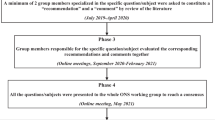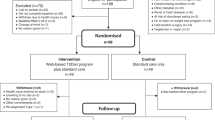Abstract
Background/objectives
Evidence supports therapeutic carbohydrate restriction (TCR) for managing appropriate patients with chronic illness, but little is known about TCR prescribing among dietitians. This study evaluated dietitians’ knowledge, information use and needs for TCR in Canada.
Methods
Registered dietitians (RDs) were recruited (n = 274) from January to December 2020 to collect semi-structured data using an online needs assessment survey (French and English). Descriptive and inferential statistics were used to describe and assess which nine RD practice characteristics predicted TCR prescription in clinical practice.
Results
Respondents were located in all provinces and territories in Canada, with few international responses in the sample (3.5%). We found statistically significant differences between RDs who have prescribed TCR or not in four practice characteristics studied: level of knowledge (p < 0.001), reviewing literature (p = 0.02), clinician referrals (p < 0.001) or personal experience (p < 0.001). Multivariable models showed that the odds of prescribing TCR was associated with intermediate/expert knowledge (OR 5.92 [95% CI: 2.26–17.77]), clinician’s referral (OR 3.22 [1.73–6.14]) and personal experience, whether a former user (OR 2.24 [1.09–4.72]) or a current user of TCR (OR 9.09 [2.70–42.09]), compared to no knowledge, no referral or no experience.
Conclusion
There is a strong link between the use, or lack, of TCR in clinical practice among RDs and their knowledge level, personal experience and clinician referrals/support. Scope exists to develop novel educational tools and resources on scientific evidence for TCR, and increase multidisciplinary teams, so as to better support RDs in Canada to safely implement TCR in appropriate patients with chronic illness.
This is a preview of subscription content, access via your institution
Access options
Subscribe to this journal
Receive 12 print issues and online access
$259.00 per year
only $21.58 per issue
Buy this article
- Purchase on Springer Link
- Instant access to full article PDF
Prices may be subject to local taxes which are calculated during checkout


Similar content being viewed by others
Data availability
The research team have full control of all primary data. All relevant data are provided in the manuscript and appendices.
References
Diabetes Canada. Diabetes 360o: a framework for a diabetes strategy for Canada. Recommendations for Governments. 2018. https://www.diabetes.ca/DiabetesCanadaWebsite/media/Advocacy-and-Policy/Diabetes-360-Recommendations.pdf. Accessed on Sep. 8, 2021.
Dietitians of Canada. Dietitians and chronic disease management: the impact of diet counselling. 2015. https://www.dietitians.ca/Downloads/Public/Chronic-Disease-2-pager.aspx. Accessed on Sep. 8, 2021.
Diabetes Canada. Diabetes Canada position statement on low carbohydrate diets for adults with diabetes: a rapid review. Can J Diabetes. 2020;44:295–9.
Paoli A, Rubini A, Volek JS, Grimaldi KA. Beyond weight loss: a review of the therapeutic uses of very-low-carbohydrate (ketogenic) diets. Eur J Clin Nutr. 2013;67:789–96.
Fardet L, Hanslik T, Blanchon T, Perdoncini-Roux A, Kettaneh A, Tiev KP. et al. Long-term systemic corticosteroid-therapy associated measures: description of the French internal medicine physicians’ practices. Rev Med Interne. 2008;29:975–80.
Health Canada. Evidence review for dietary guidance: summary of results and implications for Canada’s Food Guide. Government of Canada. 2015. https://www.canada.ca/content/dam/canada/health-canada/migration/publications/eating-nutrition/dietary-guidance-summary-resume-recommandations-alimentaires/alt/pub-eng.pdf. Accessed on Sep. 8, 2021.
Westman EC, Yancy WS Jr. Using a low-carbohydrate diet to treat obesity and type 2 diabetes mellitus. Curr Opin Endocrinol Diabetes Obes. 2020;27:255–60.
Klassen PN, Goldenberg BA, Lambert P, Vagianos K, Kim CA. Ketogenic and low-sugar diets for patients with cancer: perceptions and practices of medical oncologists in Canada. Support Care Cancer. 2020;28:5243–9.
Gallagher KA, DeSalvo D, Gregory J, Hilliard ME. Medical and psychological considerations for carbohydrate-restricted diets in youth with type 1 diabetes. Curr Diabetes Rep. 2019;19:1–8.
Ryan-Harshman M, Aldoori W. New dietary reference intakes for macronutrients and fibre. Can Fam Physician. 2006;52:177.
Welch E, Ghaderi A, Swenne I. A comparison of clinical characteristics between adolescent males and females with eating disorders. BMC Psychiatry. 2015;15:1–7.
Yoon C, Jacobs DR Jr, Duprez DA, Neumark‐Sztainer D, Steffen LM, Mason SM. Problematic eating behaviors and attitudes predict long‐term incident metabolic syndrome and diabetes: The Coronary Artery Risk Development in Young Adults Study. Int J Eat Disord. 2019;52:304–8.
Moutou KE, England C, Gutteridge C, Toumpakari Z, McArdle PD, Papadaki A. Exploring dietitians’ practice and views of giving advice on dietary patterns to patients with type 2 diabetes mellitus: a qualitative study. J Hum Nutr Diet. 2022;35:179–90.
Murdoch C, Unwin D, Cavan D, Cucuzzella M, Patel M. Adapting diabetes medication for low carbohydrate management of type 2 diabetes: a practical guide. Br J Gen Pract. 2019;69:360–1.
O’Keeffe M, Lomer MC. Who should deliver the low FODMAP diet and what educational methods are optimal: a review. J Gastroenterol Hepatol. 2017;32:23–6.
McArdle PD, Greenfield SM, Avery A, Adams GG, Gill PS. Dietitians’ practice in giving carbohydrate advice in the management of type 2 diabetes: a mixed methods study. J Hum Nutr Dietetics. 2017;30:385–93.
Diabetes UK. Position statement: low-carb diets for people with diabetes. London, UK: Diabetes UK; 2021.
Caprio M, Infante M, Moriconi E, Armani A, Fabbri A, Mantovani G, et al. Very-low-calorie ketogenic diet (VLCKD) in the management of metabolic diseases: systematic review and consensus statement from the Italian Society of Endocrinology (SIE). J Endocrinol Investig. 2019;42:1365–86.
Watanabe M, Tuccinardi D, Ernesti I, Basciani S, Mariani S, Genco A, et al. Scientific evidence underlying contraindications to the ketogenic diet: an update. Obes Rev. 2020;21:e13053.
Acknowledgements
The authors would like to thank all the study participants who gave up their time to participate in the survey. They would also like to thank the Institute of Personalized Therapeutic Nutrition (IPTN) for assisting with the needs assessment survey.
Author information
Authors and Affiliations
Contributions
AIC and ECW initiated the project, and ECW designed the survey as part of a needs assessment in collaboration with IPTN. AIC and ECW were responsible for data collection and supervised SJK in conducting the data cleaning and statistical analysis as part of a Directed Studies course. All authors were involved in data analysis, interpretation and writing of the manuscript.
Corresponding author
Ethics declarations
Competing interests
ECW is the CEO of Eat Different, Co., which provides nutrition counselling services in Ontario, Canada. The other authors declare no competing interests.
Ethics approval
The approval was obtained from the University of British Columbia Behavioural Research Ethics Board (#H19-03454-A005). The procedures used in this study adhere to the tenets of the Declaration of Helsinki.
Additional information
Publisher’s note Springer Nature remains neutral with regard to jurisdictional claims in published maps and institutional affiliations.
Supplementary information
Rights and permissions
Springer Nature or its licensor holds exclusive rights to this article under a publishing agreement with the author(s) or other rightsholder(s); author self-archiving of the accepted manuscript version of this article is solely governed by the terms of such publishing agreement and applicable law.
About this article
Cite this article
Kim, S.J., Witchell, E.C. & Conklin, A.I. Therapeutic carbohydrate restriction pre-COVID pandemic: assessing registered dietitians’ knowledge, use and perceived barriers in Canada. Eur J Clin Nutr 77, 98–104 (2023). https://doi.org/10.1038/s41430-022-01193-4
Received:
Revised:
Accepted:
Published:
Issue Date:
DOI: https://doi.org/10.1038/s41430-022-01193-4



